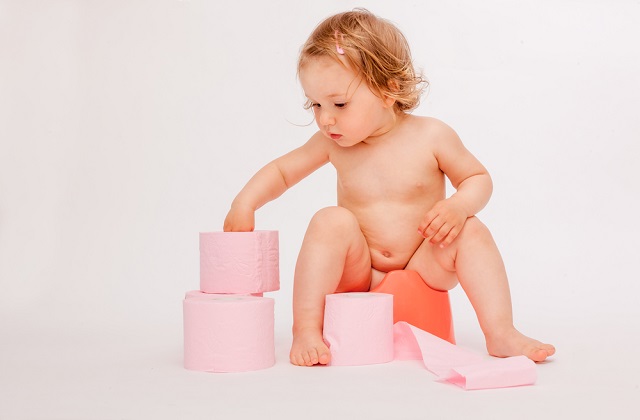Confirmation of constipation in children
Some parents start to worry about constipation in their children when their children do not poop in a day. This worry in fact may not be necessary.
Occasionally, some healthy children may not poop in three consecutive days.
Number of times of defecation is not sufficient to indicate whether you child is suffering from constipation or not, you also need to look at the shape of stool in order to confirm the constipation.
If your child's stool is dry and hard and he experiences pain during pooping, this can then suggest that your child is experiencing constipation.
Babies that suffer from constipation may also demonstrate tiredness, bloating and loss of appetite.
Causes of constipation in children
1 Insufficient fiber in diet
Insufficient fiber in diet is the cause in most cases of constipation. Fiber can stimulate the bowel movement. When there is little fiber in food to stimulate bowl movement, constipation can then occur.
Drinking too little water will cause the stool be hard and dry, this can result in constipation.
2. Lack of exercise
Exercise will help food to move quickly through the digestive system. Lack of exercises will result in less bowel movement and therefore can lead to constipation.
3. Psychological factors
Change of living environment, such as moving to strange places can cause stress to the child and this may lead to constipation.
Your child might have experienced pain during pooping in the past; fear of pain may cause him to delay the pooping. When stool is kept inside his body, water in the stool will be absorbed, this can cause the stool be hard and dry and therefore constipation.
4. Lack of training
If you had not trained your child on pooping, defecation reflex in your child will not be formed and this means that your child is not going to poop at a regular timing.
Prevent constipation in children
1. Poop at a fixed time
You should train your child to poop at a fixed time every day, best time for it will be in the morning after first milk feeding or breastfeeding. At the beginning, you need to be patient and give your child at least 10 minutes to sit on pottery and encourage him or her to poop. It will be good if there is something that your child can hold onto so that he can have more strength to push the stool out.
Once this habit is established, the defection reflex will be formed and this can help your baby to poop at a fixed time every day.
2 Drink enough water
The obvious sign of constipation is the hard and dry stool. To prevent constipation, you can encourage your child to drink more water. Try to have some water in between two milk feedings or breastfeeding.
Most babies dislike water as it is tasteless, but parents should not stop feeding babies water just because babies will not drink after one or two sips of water.
3. Ensure enough fiber in diet
Fiber can promote bowel movement which can help one to prevent constipation. The best sources of fiber include wheat bread and cereals. Fruits such as apples, pears, grapes, and vegetables such as broccoli, peas are also rich in fiber.
Treatment of constipation in children
You should seek medical help if your child does not poop for more than 3 days and he also suffer from tiredness, bloating and loss of appetite.
If your child looks fine, you can choose to massage your child to relieve the constipation.
Massage
Put your palms flat and down on your child's navel and rub gently in a clockwise manner. Doing this can speed up the bowel movement which can help to relieve constipation.
